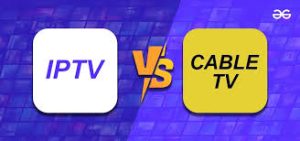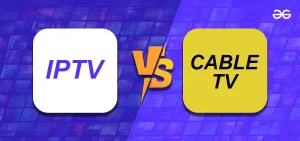 In the home entertainment industry, choosing between IPTV and Cable TV can feel overwhelming. With cord cutting trends skyrocketing and streaming technology advancing rapidly, viewers are increasingly asking: Is IPTV better than Cable TV? This in-depth comparison tackles the cost, channel variety, streaming quality, and flexibility of both services, empowering you to decide which option aligns with your needs. Whether you’re a sports fanatic craving live broadcasts, a movie buff seeking 4K on-demand content, or a budget-conscious household weighing hidden fees, our analysis of IPTV vs. Cable TV uncovers the pros, cons, and real-world performance of each.
In the home entertainment industry, choosing between IPTV and Cable TV can feel overwhelming. With cord cutting trends skyrocketing and streaming technology advancing rapidly, viewers are increasingly asking: Is IPTV better than Cable TV? This in-depth comparison tackles the cost, channel variety, streaming quality, and flexibility of both services, empowering you to decide which option aligns with your needs. Whether you’re a sports fanatic craving live broadcasts, a movie buff seeking 4K on-demand content, or a budget-conscious household weighing hidden fees, our analysis of IPTV vs. Cable TV uncovers the pros, cons, and real-world performance of each.
Discover which service delivers the best value, reliability, and entertainment experience in 2025—and why millions are ditching traditional cable for modern IPTV solutions.
What is IPTV?
IPTV stands for Internet Protocol Television. Unlike Cable TV, which uses wires, IPTV delivers TV shows and movies over the internet. This means you can watch live TV, on-demand content, and even record shows using your internet connection. Services like YouTube TV, Hulu + Live TV, and Sling TV are examples of IPTV.
How IPTV Works
IPTV sends TV content through the internet instead of cables. Here’s how it works:
- Internet Connection: You need a strong, stable internet connection to stream shows.
- Streaming Devices: You can watch IPTV on smart TVs, computers, smartphones, or using devices like Roku or Amazon Fire Stick.
- On-Demand & Live TV: You can watch live broadcasts or pick shows and movies to watch anytime.
- Subscription Services: You pay a monthly fee to access different channels and services.
Types of IPTV Services
- Live IPTV: Watch TV channels in real-time, just like with cable or satellite TV.
- Video on Demand (VOD): Pick and watch movies or shows whenever you want, like with Netflix or Amazon Prime Video.
- Time-Shifted TV: Missed a show? You can watch it later, even if it already aired.
- Catch-Up TV: Some services let you go back and watch shows from the past week.
- Subscription-Based IPTV: Paid services like Hulu + Live TV or YouTube TV offer a mix of live TV and on-demand content.
What is Cable TV?
Cable TV is a traditional method of delivering television content through coaxial cables. It has been a popular choice for decades and is known for its reliability and extensive channel offerings.
How Cable TV Works
Cable TV sends TV signals through coaxial or fiber-optic cables to your home. Here’s how it works:
- Signal Transmission: The cable company sends TV signals through wires to your house.
- Cable Box: A box connected to your TV decodes these signals so you can watch them.
- Content Delivery: You can watch live TV, movies, or special events on your screen.
- Extra Features: Some providers offer on-demand movies, pay-per-view events, or HD channels.
Types of Cable TV Services
- Basic Cable: Offers local channels like news, sports, and entertainment.
- Digital Cable: More channels with better picture and sound quality.
- Premium Cable: Access to special channels like HBO, Showtime, and Cinemax.
- Pay-Per-View: Rent movies or watch live events like boxing matches for a one-time fee.
- On-Demand: Watch shows or movies whenever you want, not just when they air.
- HD Cable: High-definition channels with clearer pictures and sound.
Cable TV is popular because it’s reliable and offers lots of choices for watching your favorite shows.
Cable TV vs IPTV Services: Which is Better for You?
Here is the detailed comparison of IPTV and Cable TV:
1. Content and Channels
IPTV:
- Offers a wide range of channels, including international and niche channels.
- Provides on-demand content and catch-up TV services.
- Often includes interactive features and multiple device support.
Cable TV:
- Known for its extensive selection of channels, including local broadcasts and premium channels.
- Limited on-demand content compared to IPTV.
- Typically lacks interactive features.
2. Quality of Service
IPTV:
- Dependent on internet connection quality; higher bandwidth ensures better streaming quality.
- Potential for buffering and lag if the internet connection is unstable.
- Generally supports HD and 4K content.
Cable TV:
- Offers consistent quality since it does not rely on internet bandwidth.
- Less prone to buffering and lag.
- Availability of HD channels, but 4K content is less common.
3. Flexibility and Convenience
IPTV:
- Can be accessed on various devices, including Smart TVs, smartphones, tablets, and computers.
- Allows for viewing on multiple devices simultaneously.
- Offers greater flexibility with packages and subscriptions.
Cable TV:
- Primarily designed for viewing on a television set.
- Usually requires a set-top box for each TV, limiting flexibility.
- Package options can be more rigid, with fewer customization options.
4. Cost
IPTV:
- Generally offers more affordable and flexible subscription plans.
- Allows users to pay only for the channels and services they want.
- No need for expensive equipment; often just requires a streaming device or Smart TV.
Cable TV:
- Can be more expensive, especially with premium channels and additional set-top boxes.
- Often includes installation and equipment rental fees.
- Typically requires a long-term contract, with cancellation fees.
5. Availability
IPTV:
- Available anywhere with a stable internet connection.
- Ideal for rural areas where cable infrastructure may be lacking.
- Can be affected by internet service provider limitations and data caps.
Cable TV:
- Requires cable infrastructure, which may not be available in all areas.
- Reliable in urban and suburban areas with established networks.
- Not dependent on internet connectivity, making it a consistent option.
Conclusion
Both IPTV and cable TV have their unique advantages and disadvantages. IPTV is ideal for those who prefer flexibility, on-demand content, and multi-device support. It is also generally more cost-effective and customizable. However, it relies heavily on internet quality, which can impact the viewing experience.
On the other hand, cable TV is known for its reliability and extensive channel offerings, making it a good choice for those who value consistent service and a broad selection of channels. However, it can be more expensive and less flexible in terms of viewing options and device compatibility.
Ultimately, the choice between IPTV and cable TV will depend on your specific needs, preferences, and available infrastructure.

